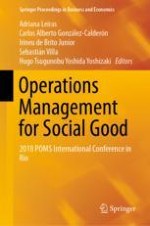2020 | OriginalPaper | Chapter
80. Worker and Manager Judgements About Factors that Facilitate Knowledge Sharing: Insights from the Brazilian Glass Segment
Authors : Jorge Muniz Jr., Cleginaldo Pereira de Carvalho, Vagner Batista Ribeiro
Published in: Operations Management for Social Good
Publisher: Springer International Publishing
Activate our intelligent search to find suitable subject content or patents.
Select sections of text to find matching patents with Artificial Intelligence. powered by
Select sections of text to find additional relevant content using AI-assisted search. powered by
